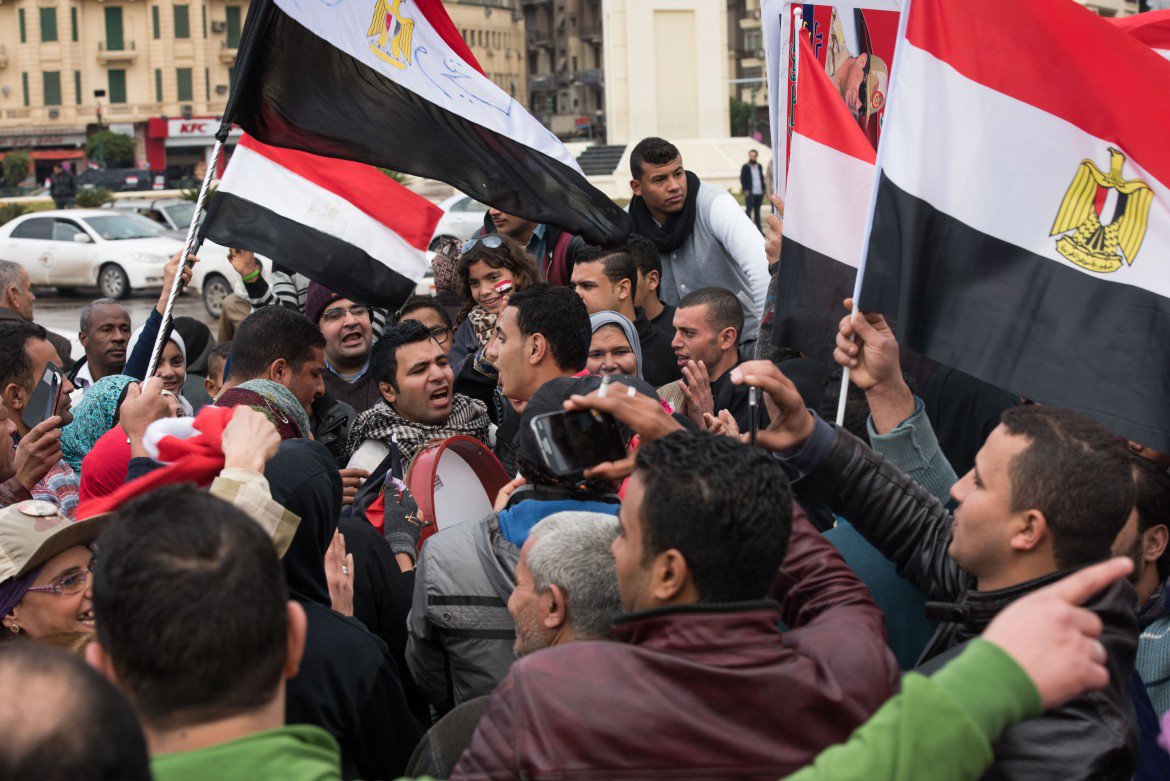Egypt
The general’s disappearing act
In 2015, there were 1,700 cases of enforced disappearance, a policy of the al-Sisi regime conducted with total impunity.

Asma’a Khalaf, Atito Islam, Esraa al-Taweel, Omar Ali, Souhaib Sa’ad. These are just a few — very few — names of Egyptians who have disappeared. Students, journalists, activists, doctors, supporters of the Muslim Brotherhood, ordinary citizens disappeared on their way to work, in their neighborhoods, at home, walking down the street with friends.
A few independent Egyptian and international organizations are picking up some of these stories and attempting to create a record. But it will never be complete because the numbers are enormous, an uninterrupted flow that connects with an invisible thread the Mubarak regime to the coup regime of general al-Sisi, passing through the short-lived government of President Morsi of the Muslim Brotherhood.
Just look at 2015 alone. According to the Egyptian Commission for Rights and Freedoms (ECRF), the Egyptian independent organization that created the campaign “Stop Enforced Disappearance,” during the first four months of the year, 1,250 Egyptians disappeared. They were followed by another 163, disappeared between April and June, and 340 more between August and November. For a total of more than 1,700 people in 11 months, an average of over four a day. This is no coincidence, but a deep-rooted, political phenomenon.
Asma’a Khalaf was a gynecologist at the Assiut University hospital. She disappeared in April 2014 as she was leaving her home. There have been no news of her since then. Islam Atito was studying engineering at the Ain Shams University. He disappeared in May of last year; according to the Egyptian authorities, he was killed in a shooting that he was a part of, together with an armed cell of the Muslim Brotherhood. This claim was denied by his relatives who think he is alive, but held in prison.
Esraa, Omar and Souhaib, all in their 20s, disappeared on June 1 in Cairo on their way to dinner together. After exhaustive searches, the families have tracked them down: They are all in jail. In this case, fragmentary information has broken out of the government’s rubber wall, a drop in the bucket of silence of the authorities in spite of pressure from organizations like Amnesty International and Human Rights Watch.
The silence remains because enforced disappearance, as proven by the activists, is a clear policy of the military regime of Abdel Fattah al-Sisi, a sinister legacy of Mubarak’s 30-year dictatorship and widely applied during the Tahrir Square revolution. Shortly after the election that made the Muslim Brotherhood victorious, President Morsi created a commission of inquiry on disappearances of the revolution: There were at least 1,200 documented cases in 2011 alone, many arrested by the armed forces, and many others killed ended up in mass graves.
Human rights activists, lawyers, independent journalists — writes Mohamed Lotfy, director of ECRF, on the Amnesty website — are subject to “arbitrary arrest, prolonged detention, brutal sentences after unfair trials, torture, forced disappearances in state hands, deaths in prison.” And, he adds, he is afraid for himself and for those who work for his organization, at the forefront in providing legal help to the families of the disappeared.
Sometimes they manage to enter the halls of power. In January, the National Council for Human Rights, a government agency, was forced to submit 191 cases to the Ministry of the Interior. And the Ministry has had to answer, at least in part. The police revealed the fate of 117 of those 191 disappeared. Out of these, they say, 99 are in prison, 15 were released and three escaped. But, the Ministry insists, no one has been the subject of “enforced disappearance.”
Yet nobody knows about more than 1,000 cases of 2015. The families try to move through informal channels, paying bribes to officials who sell information or wandering from office to office to hunt for news that won’t come forward; the human rights organizations try with former prisoners. But they are all convinced of the destiny of most of them: If they are not dead, they are illegally detained by the police, by the intelligence domestic services or by the army.
They’re detained without trial or public charges in various prisons, among which is the infamous military prison Azouli. Amnesty revealed the existence of that prison a year and a half ago. In the prison camp of Al Galaa, in Ismailiya, there are thought to be 400 prisoners, never formally charged with any crime, never brought before a court, never allowed to see a lawyer. They were caught in their neighborhoods or in the street and then tortured, deprived of medical care and forced to confess to crimes they never committed, according to the statements of former prisoners to international organization.
“The Egyptian security forces have apparently done away with dozens of people without saying a word about their whereabouts or what happened to them,” says Joe Stork, deputy director of Human Rights Watch in the Middle East. “The failure of the judiciary in investigating these cases seriously strengthens the almost complete impunity enjoyed by the services under President al-Sisi.”
The close relationship of the armed forces, intelligence services and judiciary is at the core of the Egyptian police state that is crushing freedom of expression.
Originally published at http://ilmanifesto.info/i-desaparecidos-del-generale/ on 2016-02-06
